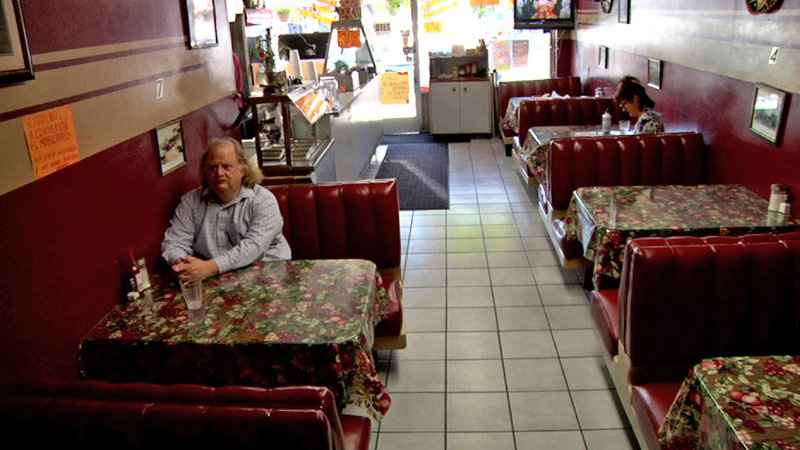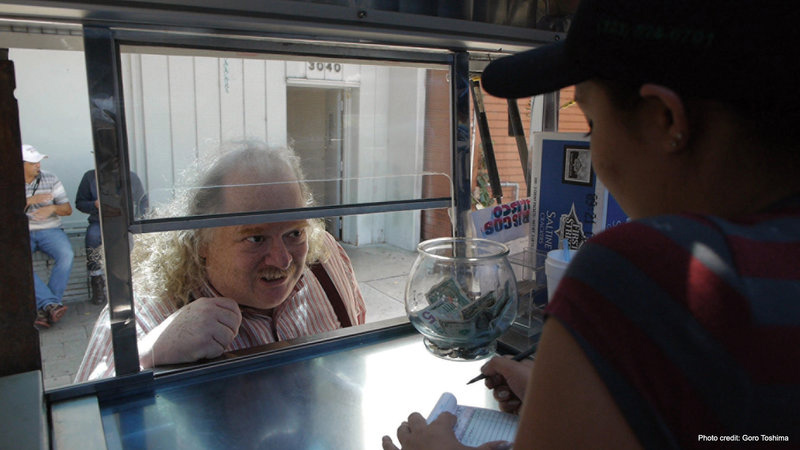Interview: City of Gold

Jonathan Gold, current food critic for the L.A. Times, and who also won the Pulitzer Prize for his work in the same field at L.A. Weekly, is credited with making a lasting change to the world of food writing. Seeking out small, traditional, neighbourhood joints along with the latest trend-setters, the way he brings the culinary world of Los Angeles to life is an ode to the city itself. We spoke to this fascinating fellow, the subject of NZ International Film Festival documentary City of Gold.
FLICKS: I’m an enthusiastic amateur when it comes to consuming food writing like Lucky Peach, it’s really interesting watching the story of someone that’s fully immersed in that world such as yourself.
JONATHAN GOLD: Oh thank you. I’m glad you liked Lucky Peach. Those guys are great. They’re my friends.
It’s so many levels above my skill level, but there’s just something about the style that still translates.
Yeah, it makes me mad that– I mean, I’ve written several things for it, but my boss at the L.A. Times for some reason won’t let me freelance for Lucky Peach. It drives me nuts because it feels like my home team… Anyway.
Let’s just get some real inside baseball stuff out of the way around journalism because I thought the film sort of struck a few chords there. You’re employed by the L. A. Times. How are the changes in journalism affecting your writing?
I mean in a way I’m watching a lot of the journalism world crumble. It seems like it is. But in certain ways, if you’re active and you’re engaged and you have a voice, I don’t think there’s ever been a more exciting time for journalism. I think the scary part is nobody knows what it’s going to be in five years.
And, I have absolutely no idea what that means, either. But I love being online. I love interacting with people on Twitter. I love sort of the immediacy of it, right. I mean, when we were growing up, you read something in the newspaper or you read something in a magazine and it would sort of… be there. It would be aloof. It would be something that you’d read, but it wouldn’t be part of your world. Now, likely the reader thinks that she’s part of what’s going on. If you’re any good at all, you’re going to pay attention to all of that. It sort of enriches your own experience as a writer. Of course the bad thing is that if your attention span is bad as mine is, you can be sucked into the maelstrom 24 hours a day.
The other side of food online is your ability to track things down with such pace, like the delicious-looking Poseidon Tostada that you were saw on Twitter.
That’s exciting. Kogi, the taco truck that was in the film, they were the first sort of major, non-sort-of-Mexican food truck in the US, I think, and they were brilliant on social media. They would tweet the location of where they were going to be. You go to an empty parking lot in a strange part of town. There would be 300 people standing there sort of looking at each other all staring at their phones, and then the truck would show up, and there’d be a party and the music would be loud. Everybody would eat brilliantly and then they’d go home. Social media has made all of those sort of random encounters through the medium of food just that much more powerful, I think, or even possible.

It’s an interesting thing to be seeing in parallel to you going to little-known neighborhood establishments. Two things that are on really distinctly different sides of what I suppose the traditional idea of a food critic is.
When I first started writing about it, a food critic was somebody who went to a very certain set of restaurants. There was an entire universe of food that existed, of course, but that it wasn’t like a proper thing to write about. When I was at the L.A. Times in the 80s, the paper wrote about the quote-unquote important restaurants. But, the sort of things that were going on with the City that made the City important – the trends and dinings that made dining here so vital, the sort of ingredients, the sort of sights and smells, and the way the City came together was way more of my beat than it was hers.
So, you look at like what Craig Claiborne was doing here in the 60s. I mean he was going to expensive French restaurants in Manhattan that all basically served the same thing. Some of them were better than the others. Some of them were not quite so good. Some were good at one dish. Some were more like on a bistro side and some were more of on a fine dining side. But that’s what was the important thing. So, it’s almost like a Classical music critic going in writing about one orchestra’s performance of Brahms Third as opposed to another orchestra’s performance of Brahms Third as opposed to now where it’s almost like turning on a pop channel on the radio – that it’s not as much the performance as it is the singing in itself.
I think that shift is something that sort of been experienced globally. And gone are the days where you get funny looks from being in the wrong establishment as well. Like you can be over dressed in a neighborhood place or you can be under dressed in an expensive place, and no one’s really the wiser.
Yeah, that’s true. It’s just a dozen years ago when I was the restaurant critic for Gourmet Magazine in New York, I remember I was wearing a tab-collar shirt that didn’t take a tie, and the maître d’ actually forced me to put on a very loud and gaudy tie because the establishment required it. That wouldn’t happen anymore.
[Laughs] Did they specifically have a gaudy one as a punishment for the patron?
Oh, they were totally awful. They were striped. They were almost fluorescent. You could have seen them from space [laughter]. Everything in the dining room knew you were wearing the tie of shame.

That’s fantastic. Of the recent food trends in L.A., are there any that you think have made a particular mark globally?
When I first started doing this, it was exciting to see what new trends emerged. The gourmet pizza thing started here and the idea of casual fine dining started here at a restaurant called Spago. The idea of the comfort food thing started here – the idea of going to a restaurant and paying $26 for meatloaf. And to some extent, the Fusion thing, which of course New Zealand and Australia have always had their own version of. Last time I was in Sydney a couple of years ago, I was almost flabbergasted to see the same three Chinese dishes in every restaurant I went to whether they were Chinese or whether they weren’t. Mud crabs are good! I understand it [chuckles].
And, yeah, it’s interesting to hear there are taco trucks in Paris, now. There are people doing Korean tacos in Prague. The idea of which I’m not sure it’s completely Angeleno, though – but it feels like it. It’s the product of growing up in sort of an immigrant community and then going off to cooking school and cooking in sort of a well-regarded or super-well-regarded kitchen somewhere. Then, coming back and using your technique to reinterpret the flavours you grew up with. It feels very local, and it obviously has antecedents in say, France in the 70s and early 80s where people were taking the technique and reinterpreting the classic food of their regions as opposed to cooking sort of a straight line, party-line escoffier. But, the sort of informal elegance of it, I guess, may seem L.A. or at least from where I sit.
Thinking about the more local, out-of-the-way places that you think you tracked down and helped put on the map for people to visit, have you seen that increased awareness come at a price? Just sort of thinking that perhaps they are not always prepared for the influx of attention that follows a great review.
I think all the restaurants that are in the film have done brilliantly at it which is why they are places that I just continue to love. There’s a place that was a regular Thai restaurant, but hadn’t untranslated it’s menu of southern-Thai specialties and somebody blogged about it. I went there and I got it translated and I had all of them. I wrote about it and then it became this bogus thing to go there and to order off the secret menu. Which meant you were eating like quite forbidden things, right, like this kidney curry and things that people order and wouldn’t eat, but you had all these sort of non-Thai people going there specifically the Thai-est of the Thai food.
It was funny because you’d have like the Thais who’d go in there and they’d order the stuff that maybe wasn’t the strange untranslated stuff, and it became almost this opposite duality to what you would expect. I couldn’t like it. I mean, I love the idea of some college student, some anglo-college student out on a date going and buying a bowl of pork-blood soup because they’d heard that’s what you should do.
Yeah, absolutely. That’s really good. I guess watching the film and sort of thinking about the context that you work in, you’re very much part of a culture rather than an outsider reporting in on it from the sidelines. Isn’t that the important place for a critic of any sort of artistic or experience based medium to be in?
Well, I think the critic has to understand the context. He or she has to understand why a chef or a painter or a writer or a composer is doing what it is that they do to understand why a certain thing is on the menu in a certain way. And, if it isn’t, to understand why it isn’t, the part of palling around with chefs, that’s only not necessary, I think it’s harmful. It’s a certain kind of writing that I think leads to, at the very least, to praising things that you shouldn’t praise or to locking yourself up into a specific mindset that is perhaps not helpful. As a critic, you have to have a really open mind and you have to be able to eat something that you despise. I mean, for example, I’m not big on eggs. I don’t like them. But, if I’m in a restaurant and then there’s a poached egg, I’ll eat it. I know the difference between a good poached egg and a bad poached egg.
I’d rather have no poached egg, but I can’t let that stop me, and I think that a critic has to have, rather than empathy for what’s going on, I think an open mind is what’s most required.
You also must have a really good idea of where you fit in in the broader conversation around dining as well, right? You can’t sort of ignore your own role in that broader conversation.
I try to actually. It was hard. It was hard to. I mean, it’s like reading the comment section at the end of an article – half the people will say, “You’re Jesus,” and half the people will say, “You’re Satan,” and none of them are right.
Where and when to see ‘City of Gold’ during NZIFF


















